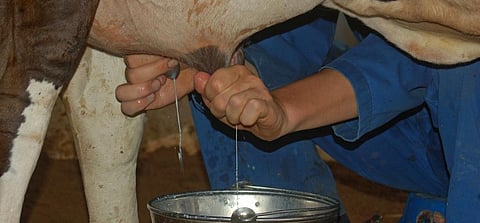

The Union government would not take any decision against the interests of homegrown cooperatives and private dairy companies as far as the Regional Comprehensive Economic Partnership (RCEP) was concerned.
This was the assurance given by the Union Ministry of Commerce and Industry to representatives from the dairy industry during a closed-door meeting on September 18, 2019.
The government had invited senior officers of the National Dairy Development Board including officials of cooperative milk companies from states like Punjab, Karnataka, Tamil Nadu, Jharkhand, Rajasthan, Chhattisgarh, and Bihar to the meeting.
RG Chandramohan, the managing director of India’s largest private dairy company Hatsun Agro Product Ltd, also attended the meeting at Udyog Bhavan in New Delhi.
The meeting was conducted by Sudhanshu Pandey, additional secretary, Trade Policy Division and chief negotiator for RCEP in the commerce ministry.
“Pandey gave a patient hearing to all of our concerns,” a senior official of a cooperative company, who attended the meeting, said. “He assured us that government will not do anything which impacts our farmers on a large scale,” he added.
“During the meeting, it was calculated that India’s homegrown dairy industry would require a support of around Rs 8-10 per kilogram of milk if the government allows import of dairy products from New Zealand and Australia at zero tariff under the RCEP agreement,” the official said.
RCEP is a proposed free trade agreement of 16 countries. It is being negotiated between the 10-member Association of Southeast Asian Nations or ASEAN, India, China, South Korea, Japan, Australia and New Zealand.
When implemented, it would be the largest trade bloc in the world. It would account for nearly 30 per cent of world trade and more than a fourth of the world’s Gross Domestic Product.
The proposed trade bloc is negotiating very hard with India to reduce duty on dairy products.
“These countries have twisted the data of India’s milk production and are projecting huge shortages of milk in India in the coming 10 years” RS Sodhi, managing director of Gujarat Co-operative Milk Marketing Federation Limited, popularly known as Amul, said.
“They are also projecting crises of fodder and water in the near future which would lead to further crisis in animal-rearing. They have a hidden agenda of destroying India’s self-reliant dairy industry. They have already destroyed the dairy market of Sri Lanka and countries of the Far East,” Sodhi added.
Earlier this month, Amul made a presentation to commerce minister Piyush Goyal and explained that India would, in fact, be a surplus producer of milk in the next 15 years.
By 2033, India’s demand of milk would be 292 million tonnes whereas production would be around 330 million tonnes.
“India will have a surplus in milk products and also the opportunity to export them. Also, India would have good availability of roughage and other fodders, along with water,” Sodhi said.